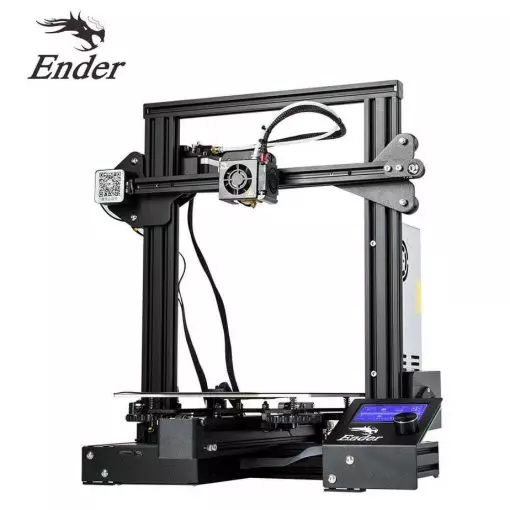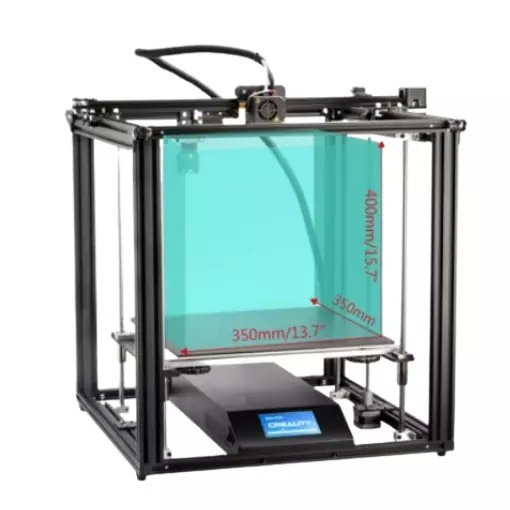Compare Ender 3 vs Ender 5 Plus
Comparison between the best 3D printers
Choose the best 3D printer at the best price. The cheapest 3D printers are here.
Buy a 3D printer here with 3D Fila.
 |
 |
|
| Model | Ender 3[BUY Ender 3] |
Ender 5 Plus[BUY Ender 5 Plus] |
| Printing Material | Filament | Filament |
| Buy Filament for Creality 3D Ender 3 | Buy Filament forCreality 3D Ender 5 Plus | |
| Estimated price | $210,00 | $599,00 |
| Manufacturer | Creality 3D | Creality 3D |
| Release Year | 2018 | 2019 |
| Print Volume [mm] | 220x220x250 | 350x350x400 |
| Printer Size [mm] | 440x440x465 | 632x619x666 |
| Weight [kg] | 6,62 | 18,2 |
| Power Loss Recovery | NO | YES |
| Enclosed printer | NO | NO |
| Bed Leveling | Manual | Automatic |
| Filament End Sensor | NO | YES |
| Bed type | Heated | Heated |
| Power supply system | Bowden | Bowden |
| Standard nozzle | 0,4 | 0,4 |
| Maximum Nozzle Temperature [°C] | 255 | 260 |
| Maximum Bed Temperature [°C] | 110 | 100 |
| Maximum printing speed [mm/s] | 180 | 180 |
| Filament holder | YES | YES |
| Camera for supervision | NO | NO |
| Recommended filaments | PLA, TPU, ABS, PETG | PLA, TPU, ABS, PETG |
| Recommended slicers | Cura, Simplify, Slic3r | Cura, Simplify, Slic3r |
| Maximum Resolution [mm] | 0,1 | 0,1 |
| Processor | 8 bits | 32 bits |
| Display | Mono | Touchscreen TFT 4,3'' |
| Power Supply | 24V / 270W | 24V / 504W |
| Connectivity | SD / USB | SD / USB |
| Operating systems | Windows, Mac, Linux | Windows, Mac, Linux |
| Date of registration in the system | 2021-04-13 | 2021-04-14 |
| Release date | 2018 | 2019 |
| Extra features | The Ender 3 V1 is a DIY assembly 3D printer, a sales leader since 2017, standing out for its cost-benefit. With a wide printing capacity, it has a CNC machined structure for precision and stability. It offers high-precision prints with low noise, thanks to its innovative V-profile and pulleys. It has a self-adhesive magnetic platform for easy removal of models and excellent adhesion. The Ender 3 heats up quickly, reaching 100°C in 5 minutes, ideal for agile prints. It includes protection against power failures, allowing you to resume printing after interruptions, saving time and material. | The Ender 5 Plus offers a large print volume (350x350x400 mm) and fast assembly. It includes a BLTouch sensor, but with range limitations. It stands out for its dimensional accuracy, although it requires adjustments to the slicer settings. Despite the noise, its integrated design saves space, and includes features such as a filament sensor and power resumption. Ideal for large projects, it requires refinement in the settings for high-quality prints. |
| Support for multiple colors and materials (AMS and CFS) | NO | NO |
Notes * |
||
| Cost-benefit | 6 / 10 | 6 / 10 |
| Hardware | 0.5 / 10 | 2 / 10 |
| Tela | . | . |
| Print volume | 3 / 10 | 4 / 10 |
| Performance | 1 / 10 | 1 / 10 |
| [BUY Ender 3] | [BUY Ender 5 Plus] |
Conclusion |
| In comparing the Ender 3 and Ender 5 Plus 3D printers, it's clear that both models cater to different user needs and priorities, which should guide your purchasing decision. The Ender 3 stands out as an excellent option for those seeking affordability without compromising on quality. With its smaller print volume, manual bed leveling, and basic features, it delivers reliable performance for hobbyists and beginner users. The printer's user-friendly assembly, efficient heating capabilities, and power loss recovery mechanism enhance its value, making it a great choice for cost-conscious individuals looking for decent print results. Conversely, the Ender 5 Plus is tailored for users who prioritize larger print capacities and advanced features. While it comes at a higher price point, it compensates with a more significant build volume, automatic bed leveling, and a filament sensor, making it suitable for larger or more intricate projects. Its 32-bit processor and touchscreen interface further contribute to a more modern user experience, albeit with a trade-off in noise levels during operation. In conclusion, if budget considerations are paramount and you're starting out in 3D printing, the Ender 3 offers remarkable cost-to-performance benefits. However, if you require larger print sizes and advanced features for more complex projects and are willing to invest more upfront, the Ender 5 Plus may be the better choice for your needs. Ultimately, your decision should align with your specific printing requirements and how you anticipate using the printer in the long term. |

